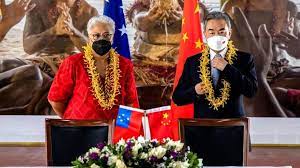
BBC News:-
China’s Foreign Affairs Minister Wang Yi has been on a marathon tour across the Pacific Islands – his visit was a sign of Beijing’s willingness to close a sweeping trade and security deal with 10 countries in the region.
The ambitious deal – which covered a wide range of issues, from cybersecurity to a Chinese-funded police training academy and setting up more Chinese cultural links across the Pacific nations – was meant to tie the region much closer to Beijing.
But it was revealed this week that the deal had been shelved after many of the countries declined to sign, expressing concerns over certain aspects of the agreement.
Does this mean Beijing’s Pacific ambitions have been thwarted – at least for now?
A growing interest
China has long had its eye on the Pacific Islands, where it has been steadily growing its trade, aid, diplomatic and commercial activity since 2006. Between then and 2017, Beijing provided close to $1.5bn in foreign aid to the region through a mixture of grants and loans, according to the Lowy Institute.
Experts say various factors drive China’s interest.
“Historically, in times of conflict, the Pacific has been geographically significant because of the ability to control supply and access,” says Mihai Sora, an analyst at the Lowy Institute.
“Winning influence in the Pacific [also] means you have a region bloc that may be more sympathetic to your position on issues that are decided in international spaces, like UN votes.”
Mr Sora adds that China’s ambitions in the Pacific Islands are also part of a “long-term campaign to diminish international diplomatic support for Taiwan” – he points out that over the past few years, several Pacific nations have switched diplomatic recognition from Taiwan to China.
“And lastly, resources: China is the main customer for Pacific resources and these are important to China’s development. So securing better access to these resources is also a priority for China.”
But China’s Pacific interests have increasingly sparked concern in Australia, which has traditionally considered the Pacific to be its “backyard”.


 Users Today : 77
Users Today : 77 Users Yesterday : 65
Users Yesterday : 65 Users Last 7 days : 159
Users Last 7 days : 159 Users Last 30 days : 159
Users Last 30 days : 159 Users This Month : 159
Users This Month : 159 Users This Year : 159
Users This Year : 159 Views Today : 175
Views Today : 175 Total views : 405
Total views : 405 Who's Online : 0
Who's Online : 0